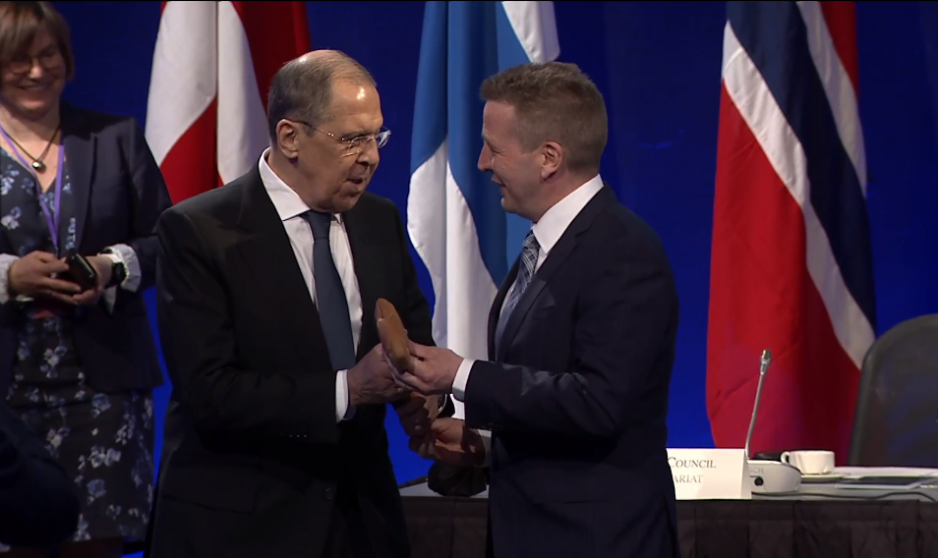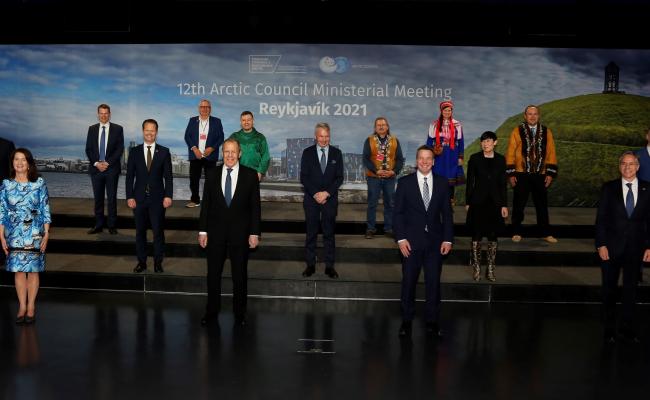Op-ed: Move Forward Without Russia: How the Arctic Council Can Keep Up Its Work

Russian Foreign Minister Sergey Lavrov receives the gavel from Icelands Foreign Minister, Gudlaugur Thór Thórdarson during the Arctic Council Ministerial meeting at the Harpa Concert Hall in Reykjavik, Iceland May 20, 2021. (Photo: Arctic Council)
The opinions expressed herein are solely those of the author and do not represent the views of the U.S. Government, The Brookings Institution, or High North News.
The preeminent forum for Arctic cooperation was an early casualty of the war in Ukraine, and rightly so. The other seven Arctic States were quick to announce a “pause” in their meetings and effectively all cooperation on pan-Arctic governance has ceased.
With Russia holding the chairmanship of the Council, the Rules of Procedure give them broad powers to set the agenda and tone of the organization, something that the other Arctic States cannot tolerate from such a flagrant violator of human rights and international law.
In the meantime, there is a frantic search for the way-ahead. The consensus-based, inclusive structure of the Arctic Council was celebrated as a model for cooperation, but is now hindering the search for a solution to continuing its work during Russia’s well-deserved pariah status. Key to this dilemma is the Arctic Council Rules of Procedure, particularly Rule 7:
In accordance with the Declaration, all decisions of the Arctic Council and its subsidiary bodies, including with respect to decisions to be taken by SAOs, shall be by a consensus of all eight Arctic States.
Is it appropriate to indefinitely pause the Council?
“Consensus of all eight Arctic States” is something that was once celebrated by even the most skeptical of international organizations and global governance bodies.
At his now infamous speech at the Rovaniemi Ministerial, U.S. Secretary of State Mike Pompeo stated, “This forum that we’re in today embodies many of the characteristics that we’d all like to see in multilateral forum all around the world; it’s built on the bedrock principles of individual sovereignty, voluntary cooperation, and shared responsibility.”
But if there are essential governance issues that require a pan-Arctic solution, such as environmental research cooperation, scientific study, and sustainable investment opportunities - is it appropriate to indefinitely pause the Council?
A growing number of voices in the non-Russia Arctic States are contemplating a way forward without Russia and the joint statement that was issued on March 3rd hints at “necessary modalities” to continue their work.
It may be in Russia’s long-term interest to let them.
Rules Matter
The Arctic Council is an intergovernmental forum, not a treaty-established international organization with legal personality. Contrary to the belief of some, the Ottawa Declaration that founded the Council is not a binding treaty and the Rules of Procedure that govern the Council are similarly not legally-binding on any State. The eight Arctic States may choose to adhere to the current terms of the Arctic Council, or they may not.
This does not mean, however, that the Ottawa Declaration and the Rules of Procedure that were negotiated by all eight Arctic States have no meaning or authority. These were high-level agreements made in careful negotiation among the Foreign Ministers of all eight States and the representatives of the Permanent Participants.
Their agreement and the subsequent practice of all eight Arctic States cannot be discarded even with an aggressive Russia in their midst. To do so could have long-lasting impacts on international cooperation well beyond the Arctic. Rather, the remainder of the Arctic States need to present Russia with a clear-eyed choice about the future of the Arctic Council.
Silence or Death?
Russia should be given a clear choice: Voluntarily absent itself from the Arctic Council for the time-being or the other seven Arctic States will establish a parallel forum which will forever doom the current Arctic Council.
Arctic Council Rule of Procedure Three states, “Six of the Arctic States shall constitute a quorum for purposes of holding a Ministerial or Senior Arctic Official (SAO) meeting.” It goes on in Rule Seven to allow for a procedure to holding meetings and making decisions without all eight States present:
“In the event that a Ministerial or SAO meeting is held without the attendance of all eight Arctic States, consistent with Rule 3, decisions may be taken by a consensus of all Arctic States present, subject to confirmation in writing by the absent Arctic States within 45 days after receiving notice of the decision.”
The benefit to Russia of agreeing to this self-imposed isolation is their ability to maintain a say in Arctic Council final decisions through correspondence. Said correspondence can be effectively managed through the Arctic Council Secretariat in Tromsø, allowing the other seven Arctic States to continue their freeze on Russian high-level communications.
The real trick is how to manage the end of the Russian Chairmanship.
The working groups of the Arctic Council, where most of the actual technical work is accomplished, contains a similar procedure in Rule Eight: “Decisions of working groups, task forces or other subsidiary bodies may be adopted by a consensus of all Arctic States present, subject to any objection in writing by an absent Arctic State within 30 days after receiving a report containing the decision.”
The real trick is how to manage the end of the Russian Chairmanship, as it is not scheduled to end until Spring 2023 when Norway will take over. Rule Ten outlines the obligations of the Chairmanship and defines how to pass a Chairmanship:
“The Chairmanship shall act as chair of the Arctic Council from the conclusion of a biennial Ministerial meeting to the conclusion of the next biennial Ministerial meeting, and shall coordinate arrangements for Ministerial meetings…”. Thus, it is clear that an amendment to the Rules of Procedure will be needed to pass the Chairmanship to Norway prior to the next “biennial Ministerial meeting”.
The decision to leave the current Arctic Council is one for each State to make on its own.
This simple amendment can be accomplished by agreement of all Arctic States according to Rule 48.
Should Russia balk at this premature loss of their Chairmanship, the other Arctic States and Permanent Participants should consider a new parallel body and announce with one voice their intention to carry-on the important work of the Council without Russia. This “Oslo Declaration” could establish a new charter and rules of procedure, with Norway assuming the first Chairmanship.
The decision to leave the current Arctic Council is one for each State to make on its own and is completely in keeping with their obligations to the Ottawa Declaration and Rules of Procedure. There would be nothing that Russia could do to stop this unified action.
Arctic Cooperation Matters
It is impossible to know when the Russian government will once again be trusted to cooperate and collaborate on matters of global governance. At the same time, it is clear that the seven other Arctic States are growing increasingly distant from Russia and lines of communication are growing thin. With the prospect of Finland and Sweden joining NATO, the urgency for a compromise on the Arctic Council may become critical.
A new parallel body formed by seven NATO-member Arctic States may look very unfriendly to Russia in the future, making these amendments to the Rules of Procedure look more tenable to a Russia that is increasingly isolated. This compromise also allows room for future engagement with Russia, when the situation allows, within the construct of the current Arctic Council and without fanfare or treaty.
It may sound like folly to convene an Arctic Council without the largest Arctic State, but it is also silly to let this creation slip away.




